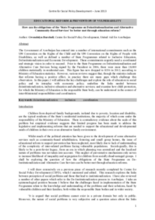In this paper from the Centre for Social Policy Development, United Aid for Azerbaijan, Gwendolyn Burchell asks “How can the obligations of the ‘State Programme on Deinstitutionalization and Alternative Community-Based Services’ be better met through education reform?” The Government of Azerbaijan has enacted a number of State Programmes related to Inclusive Education, DeInstitutionalization and Economic Development. The author argues that these commitments urgently need a coordinated and strategic vision in order to succeed.
Prior to the State Programme on DeInstitutionalisation and Alternative Care Services being signed by the President in 2006, there were more than 18,000 children statistically in residential care. This figure has now dropped to 8336 in 2012, according to Ministry of Education statistics. The paper explores the role of education in social policy and its interplay with economic policy; underline the links needed between deinstitutionalization, inclusive education and alternative services; and examine how child protection, for which the Ministry of Education is the responsible State body, can be understood in the context of inter-Ministerial responsibilities and coordination.
According to the author, the link between educational reform as a means to support the prevention of family separation and institutionalization has been neglected. Children from deprived family backgrounds, isolated due to poverty, location and disability, are the typical residents of the State’s residential institutions, the majority of which come under the responsibility of the Ministry of Education. There is contradictory evidence about the scale of this problem but empirical evidence suggests that limited progress has been made to address the legislative and implementing reforms that are needed to support the educational and developmental needs of children in their own or an alternative family environment. Whilst much of the political attention has been given to the development of some alternative services such as community-based rehabilitation, fostering and small group homes, the issue of educational reform to support prevention has been neglected, most likely due to lack of understanding of the complexity of inter-related problems facing vulnerable populations. This neglect of preventative mechanisms only serves to increase likelihood of inequality and segregation for children from socially disadvantaged groups.
The social policies of Azerbaijan need a coordinated vision with regards to the inclusion of children in need of protection, to avoid them being placed in institutions, living on the streets or being isolated at home. Education policy be viewed within the prism of social and economic policies. The paper also suggests that the Child Protection Department (CPD) would do better to promote child welfare and protection through collaboration with State bodies to support a transition to an inclusive child welfare system. Additionally, the author recommends that disability should be integrated throughout all policies related to care, rather than treated as a separate issue.
Burchell also reviews several papers and draws extensively on a previous piece of research completed by the Centre for Social Policy Development (CSPD) which explores the links between the perception of social problems and those that lead to institutionalization. Burchell takes an epistemological position, emphasizing that the challenges faced in implementation of the State Programme relate to the public’s knowledge and understanding of the problems faced by vulnerable children and their families as well as the public’s understanding of the solutions to those problems, both within the responsible State bodies and in wider society. She suggests that a society which places the fault of institutionalization upon the parents when there are inadequate social safety nets and exclusive education systems in place is a society which needs increased awareness about the role that Ministries are playing in addressing these problems, and why these are problems which affect everyone in society, regardless of wealth or social position.
©United Aid for Azerbaijan

